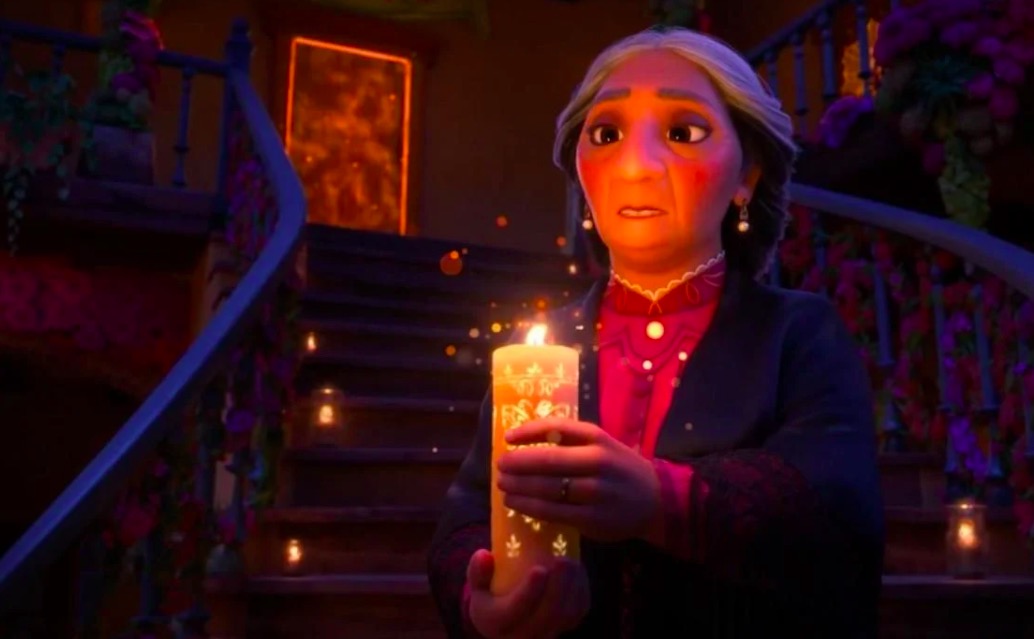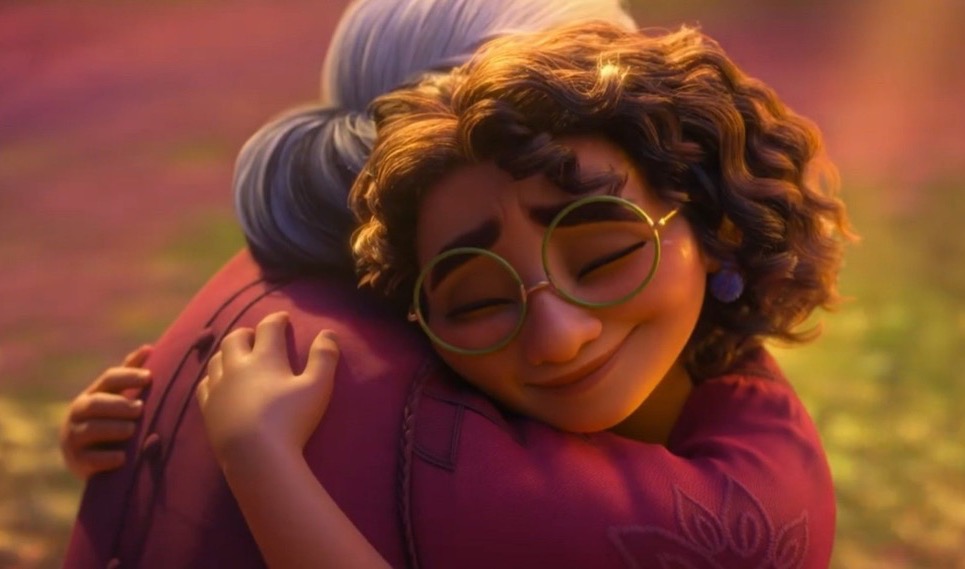Family is weird. At times, it can be the most important thing around you and yet be steeping in toxicity. A lot of us, especially those from marginalized communities and backgrounds, carry a lot of weight that we just can’t unload. It’s a weight that has been slightly lightened over generations but is still heavy by the time it gets to you. That weight and the fear and guilt associated with it is the heart of Disney’s latest animated feature, Encanto.
Encanto is a film about a magical family whose miracle saved them from near-certain death and created a valley as their refuge. Magic is central to who the Madrigals are as people and as protectors of their village. They have powers to help the people, and if they can’t help, the family’s matriarch, Abuela Alma, is sure that they will fail and lose their home. But when Mirabel is born without powers, everything begins to crack, and the family—particularly Abuela—has to realize that what they are is more than their power and that, ultimately, there isn’t just one way to be a Madrigal.
Over the course of the film, Abuela gets increasingly meaner. She’s short with Mirabel and turns every moment into one that shames Mirabel’s very existence as harmful to the family. Mirabel is just expected to remain in a corner, out of sight. She’s left out of family portraits and belittled by her “perfect” sister, and the weight is too much to carry—but she does.
My grandparents had a kindergarten and a first grade education. When they were children, they were put to work on farms to earn cents per day to keep their family fed. I don’t know the extent of what was experienced on the farm, but what I do know was that for both of them, it was too much to talk about.
They had seven kids, including my mom, and they all spoke English as a second language. Growing up, the education system in central Texas pushed assimilation, which, for my mother, meant being hit with a ruler when she spoke Spanish. Her brown skin made her culture even more of a sin and instilled a fear in her.
Then, my mom had me. I was a girl, I was brown, and she made a choice: She would make sure I succeeded. She refused to teach me Spanish. She gave me a name she thought was white enough to pass, and she pushed me hard in school—I mean, come home with a 98 and she would say, “Where are the other two points?” hard.
My culture was stripped from me, and piece by piece I was pushed into being someone my mom saw as successful. In many ways, my success, my degrees, they would be our miracle. My achievements would somehow make everything worth it. But when I was a kid, I didn’t know that. All I saw was a woman who was supposed to love me push me relentlessly. I worked two jobs, I played sports, I got good grades, and then I broke. I absolutely shattered.
I’m better now. I have a career, a loving marriage, and the path I chose was one that threw away every single thing that my mother wanted for me. I got the degree she wanted, but not in what she wanted. I left my PhD program after the racism and sexism got to be too much, and I chose to just walk away until, finally, my passion brought me to where I am today. But it wasn’t easy.
Growing up, I was very cognizant that I, a child, was my family’s future. My success meant theirs, and my growth meant that I had completed some family story arc my parents had constructed in their head. It wasn’t easy. There was a lot of pressure, yelling, sweeping of mental illness under the rug, a couple of runaway attempts, and therapy. I cracked under it all, and for years once I left the house, the anger I felt from carrying that weight stayed a constant.
Then I had a conversation with my mom, and then another, and another. And over my adult life, I realized something: She didn’t know the pain she caused. To her, every choice, every mean word, every push, every single act was love, the only way she knew how to show it.
Without realizing it, my mother didn’t escape the pain she had felt. She buried it deep in me. Over each generation, a little bit less got transferred, but it was still there—the fear and the judgement, nourished over time by the specter of failure. I needed to be perfect; I needed to represent the family.
“Don’t be a statistic.”

The same meanness we see from Abuela, I saw from my mom—small moments that add up over time to make you feel small. They’re meant to push you, but they break you instead, and the pain is too much to forgive at times. I still haven’t forgiven my mom for everything, but I have forgiven her for a lot of it because she didn’t know what else to do.
She had brought a life into this world, and I looked just like her. So when she saw me, she didn’t see me. She saw every abuse that had happened to her. She saw the slurs she had been called. She saw the times she had been hit. And when I was older and the resentment grew, and I spoke loudly of how she treated me, she listened.
I’ve cried a lot with my mom. We’ve talked about the decisions she made and how she’s realized they were wrong. But we’ve also discussed how they were the only ones she knew how to make. She apologized to me, and I listened.
Encanto captures this beautiful meeting across generations that’s filled with pain and sadness, but also hope. Abuela and Mirabel sit on a small dock with the film’s most stunning song “Dos Orguitas,” and they open up to each other. Abuela shares her story, how Mirabel’s grandfather died trying to save the community, and how every day of her life since has been spent trying to preserve the miracle his death left them.
It’s a gutwrenching scene because of how important it is to understand that the film’s “villain” is driven by love. She’s driven by the need to keep her family safe and to keep the Madrigals surviving and growing, and honoring the sacrifice.
Mirabel’s response is understanding. Abuela’s is, too. They talk to each other and they listen, and they move forward. In the film’s conclusion, Mirabel is not granted magic, but she is given her spot in the family and, in turn, uncovers how her mother’s generation and hers were all carrying the weight of their powers.
We don’t owe anyone forgiveness, including our family. But what Encanto shows is how to meet them. We can meet the parents and family members who buried their trauma in us and learn from them. We can see the best intentions, and so long as our mothers, fathers, and grandparents understand their mistakes, we can grow from them.

Encanto showcases the duality of family. The beauty and love that comes from it and the unrelenting pressure and sadness that can come from it, too. It’s a call to talk and to see each other, instead of just pretending like everything is okay. It’s not about forgiving our family, just hearing them and learning.
(images: Disney)
Want more stories like this? Become a subscriber and support the site!
This article includes affiliate links, which may provide small compensation to The Mary Sue.
—The Mary Sue has a strict comment policy that forbids, but is not limited to, personal insults toward anyone, hate speech, and trolling.—









Published: Dec 1, 2021 05:36 pm